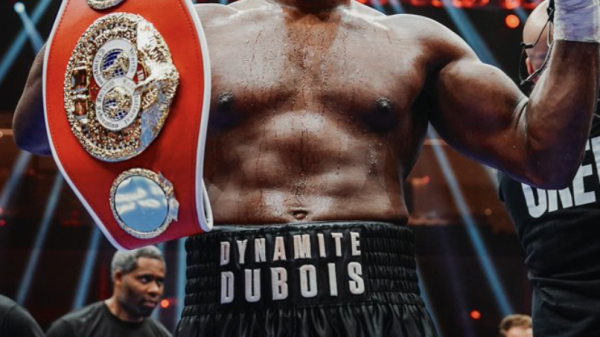By Tyson Bruce
To be a true boxing fan a great deal of patience is required. The average sports fan that turns on the “boob-tube” to be casually entertained doesn’t seem to have the patience for boxing anymore. No one has any idea who the champions are anymore and casual fans don’t understand why the fights the public demand never seem to get made. This type of thinking has mushroomed since the failure of Mayweather-Pacquiao—a match that would have made boxing the jewel of the sports world—leaving many fans to turn their backs on boxing all together. It also created a new trend where boxers seem more focused on masquerading as businessmen instead of fighters.
Many boxing insiders predicated that 2013 would be a complete disaster for the sport because of the rising tensions in boxing’s so called “Cold War”. Golden Boy got banned from HBO and the public mudslinging between GB’s Richard Schaefer and Bob Arum was never more petty. So it came as a surprise when the year turned out to be a massive success with many great fight cards. The competition between Showtime and HBO seemed to galvanize the networks to put on the best possible cards. Many articles were naively written about the benefits of competition and how the fissures in the boxing business could result in a spike in the long-term quality of televised prizefighting. They didn’t realize that it was simply the calm before the storm—that storm being 2014.
Boxing in 2014 has not been without its successes but even many of those successes seem like accidents. Did anybody really think John Molina, not even a top-ten ranked fighter, would give Lucas Matthysse the rousing battle he did? That the fight turned out to be a highly entertaining does not make up for the fact it shouldn’t have happened in the first place. This is just one example of many you could cite in a year that has been defined by grotesque mismatches and fights that nobody wanted to see.
Showtime in particular has seen a drop in quality in 2014. For years the network played the role of the ugly step-child to HBO but in 2013 they took sole possession of Golden Boy’s stable of talent and revamped their broadcasting crew to create a fresh approach. The results were immediate as they consistently put together solid cards from top to bottom and produced the highest grossing PPV of all-time with Mayweather-Canelo. Many people thought they were ready to compete on an even playing field with HBO or even surpass the network giant. Yet, a mere eight months later, any goodwill generated has been utterly squandered by perceived favoritism towards Al Haymon fighters.
The frustration towards Haymon/Showtime peaked with the Garcia-Salka card. This card was all about money—lots and lots of money for easy fights. For just seventeen rounds of utterly one-sided boxing the total salaries of the six fighters reached nearly 1.5 million. Is it really in Showtime’s interest to waste that kind of money on non-competitive fights that just alienates your already jaded fan base? What about the many other talented and deserving fighters that warrant an opportunity in the spot light? Fighter’s like lets say, Keith Thurman?
An equally frustrating part of this year has been the failure to capitalize on the breakout success many fighters had in 2013. Keith Thurman burst onto the welterweight scene by scoring resounding knockout victories over solid contenders, Diego Chaves and Jesus Soto Karrass. In the process be became one of boxing’s newest and most explosive young fighters. Many experts believed that a defining fight against a top welterweight contender, of which his manager Al Haymon controls about two thirds of the playing field, was right around the corner. Instead Thurman has been sidelined for much of 2014, fighting just once against the hopelessly overmatched Julio Diaz. He has openly complained about the frustration of not being able to fight a Tim Bradley or Manny Pacquiao—or even the other top fighters within his own stable that don’t seem to want anything to do with him.
Thurman is not the only star of 2013 to be ignored and excluded. Gennady Golovkin has been considered the best middleweight since Sergio Martinez struggled to beat Martin Murray in 2013 and yet he remains ostracized from the elite level because he is perceived to be an unknown quantity. This of course is complete nonsense, as Golovkin is probably the fastest rising star in boxing and drew upward of 9,000 fans for his most recent fight in Madison Square Garden. The top boxing stars don’t want to fight Golovkin because they don’t want to take the risk of being his latest knockout victim. The elite fighters in boxing and their brain trust would rather manipulate the public into taking the best fights with lowest risk—emphasis on lowest risk.
This is why Adrien Broner and Lucas Matthysse are fighting on the same Showtime boxing card in separate bouts against fringe contenders. Broner is fighting Emanuel Taylor, 18-2-0-(12), and Matthysse is fighting Roberto Ortiz, 31-0-1-(24). Presumably, they are both on the card to build towards a hypothetical matchup against each other. Massive super-fights between star fighters, like Leonard-Hearns or De La Hoya-Trinidad, requires a marinating process to guarantee maximum profit, but since when does a fight between two contenders need that? Ideally, a fight like Broner-Matthysse would be a box-off towards a legitimate title shot against lineal champion Danny Garcia. Instead we have two probable mismatches with million dollar price tags and the guarantee of nothing.
Many people optimistically thought that after Golovkin crushed top-ranked contender Daniel Geale in just three rounds a long overdue shot at the middleweight crown would be his. Instead, he is fighting yet another solid but uninspiring fighter in Marco Antonio Rubio. Likewise it appears that Thurman will not be getting a major fight, with rumors circulating that he will be fighting fellow Haymon fighter Roberto Garcia. Fans on social network are already turning against the two potential stars, citing Golovkin and Thurman as two fighters whose massive hype is not supported by their in the ring accomplishments. What they probably should be doing is coming to their aid and recognizing that these are two guys who are willing to fight anyone and are being marginalized by the people that want to you to believe that Rod Salka and Chris Algieri are somehow more worthy of your time and money.
Boxing will continue to endure no matter what because the people who follow boxing do so with an almost religious like zeal. But if boxing is to continue to grow and become a money making source for years to come, isn’t it important to at least occasionally reward your audience and perhaps, god forbid, make some new ones? This certainly hasn’t been the case in 2014, where boxing has resembled a moveable circus of high-level talent performing human sacrifices across the country. In Great Britain Froch-Groves II drew 80,000 spectators and made outrageous amounts of money for all involved because it was the fight people wanted. American promoters might want to take notice before boxing in this country is beyond saving.







